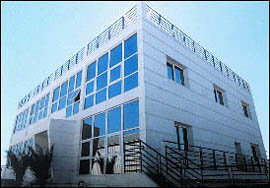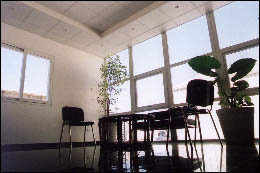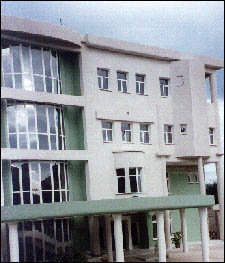 BKL INDUSTRIES PRESENTATION BKL INDUSTRIES PRESENTATION |
BKL Industries is a joint-stock company, which capital reaches 24 000 000 DA. It was created on February 2nd 1989 and was granted an Interministerial Order and assent of the National Commission of Agrément on May 2nd 1988. BKL Industries employs 343 persons in different services: administration, technical, production and realisation. More than 2000 building sites have been undertaken in Algeria and abroad. BKL products are granted type-approval for more than 10 european building and carpentry techniques.
 Activity Activity |
Building equipement, industrial joinery
Manufacturing units of PVC industrial joinery.
Industrial manufacturing unit of double and triple sealed glass partition (thermal and sound insulations)
Studies ans realisation of all building trade joineries (PVC, Aluminium, Metal, MasterCraft)
 PRODUCTION PRODUCTION |
 Capacity Capacity |
Turnover 50 000 000 USD
Optimal production 240 000 windows and doors 4000 tons
Annual production 100 000 windows and doors 1800 tons
 Products Products |
Windows, French-windows, doors and any joinery
Range of referenced products – Literature ans general reference tariffs
 Exportation Exportation |

France
Spain
Germany
Russia
Liban
Irak (en cours)
 CERTIFICATIONS CERTIFICATIONS |
 Products standardisation Products standardisation |
Algeria
ENACT 6291 cc/93 certification
Russia
Homologation GOST (NIIMISTROY)
Joinery and double glass partition
N° P DZ 9016.1.140031
France
Up to standards NF 24500
AEV: A3 E2 V2
Certification in process
Germany
Up to standards N° 18500 ROZENHEIM
Certification in process
 Certifications Company Certifications Company |
Selected for an update in the context of improvement of International Competition by the United Nations Organism for Industrial Development (UNOID) from 15/02/2001 to 30/09/2001
Selected by the United Nations Organism for Industrial Development (UNOID) and by the Industry Ministry for the ISO 9001 – 2000 certification from 06/01/2002 to 15/12/2002, planned certification date |  JOINERY JOINERY |
 Requirements Requirements |
Joinery, like any other sector of the building trade, has to follow precise technical standards:

Longevity
Mechanical resistance to deformations
Mechanical resistance to shocks
Wear and corrosion resistance
Thermal and sound insulation
Watertightness
Conductivity
Fire resistance
Whatever the material and manufacturing techniques used, joinery has to be up to quality standards.
Here are the results of a comparative study of the different materials used for joinery manufacturing:
 Wood Wood |
Advantages
Moderate cost
Known and traditional material
Good thermal and sound insulation
Low conductivity
Good mecanical resistance
Apperance: traditional
Disadvantages
Limited longevity
Sensitive to wear, usury, corrosion and atmospheric elements
Necessary periodic maintenance (sanding, varnish, painting)
Average fire resistance
Often bad quality material used

 Aluminium Aluminium |
Advantages
Stable
Very good mechanical resistance
Insensitive to wear and corrosion
Good watertightness
No maintenance
Appearnce: modern
Disadvantages
High cost
Very high conductivity
Very bad thermal and sound insulation
Average fire resistance
Surface treatment often insufficient which implies a noticeable decrease in the material quality. |

